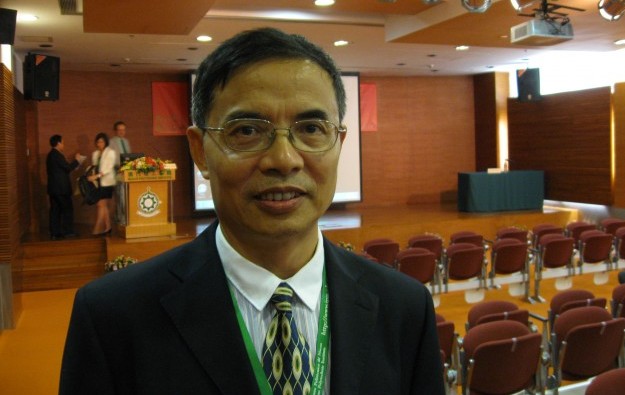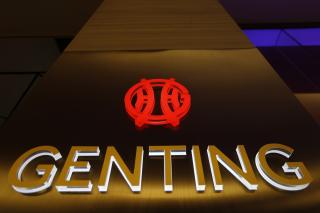Time works against casinos: academic

Casinos mainly rely on demand from local and neighbouring markets, but time works against the industry, says professor Zeng Zhonglu (pictured) of the Gaming Teaching and Research Centre at Macao Polytechnic Institute.
As time passes, local populations get used to living alongside casinos and the rate of participation in gambling slides, Mr Zeng told the audience of the Macao Gaming Summit, the conference accompanying the Macao Gaming Show, which started on Tuesday.
“People in Nevada are adapting to casino gaming there,” Mr Zeng said, adding that his research shows a similar trend in Macau and Hong Kong.
The rate of participation in casino gaming among the Hong Kong population has dropped slightly in the 10 years to 2011, said the academic. That index jumped from 12.1 percent in 2001 to 15.8 percent in 2005, following the opening of Sands Macao in 2004, the first Las Vegas-style casino in Macau.
But the participation rate in casino gaming in Macau among the Hong Kong population dropped to 11.9 percent by 2011, “even as more and bigger properties opened,” said Mr Zeng.
The rate participation in casino gaming followed a similar pattern in Macau. It went up from 20.2 percent in 2003 to 23.6 percent in 2007, followed by a decline to 20.7 percent by 2010. The index fell to 11.9 percent by 2013, as the legal age to enter casinos rose to 21 following an amendment to the gaming legislation, the scholar said.
“Time is against casinos. The longer people live in a place with casinos, the less they will gamble,” stated the academic. “That, in turn, could be positive to help reduce problem gambling within a community,” he added.
For casinos to remain attractive, they need to keep upgrading their offering and also diversify, said Mr Zeng.
The academic cited the example of Atlantic City, in the United States: “Between 1978 and 1985, Atlantic City saw rapid growth in gaming, with an average annual growth rate of 55.1 percent. After 1985 and until 2006, the average annual growth rate stood at 4.4 percent. After 2006, the industry declined on average 8.2 percent per year until 2013.”
Atlantic City saw a 6.2 percent fall in gaming revenue for the full year in 2013, according to data from the Atlantic City Convention and Visitors Authority.
Trump Plaza Hotel and Casino closed in September, making it the fourth casino to close in Atlantic City this year, costing thousands of people their jobs.
Macau should learn lessons from Atlantic City, where casinos failed to adapt sufficiently their offer to customers, said Mr Zeng.
“From the data and the analysis we concluded that the future of the casino industry would still be reliant on local and regional markets,” he added.
Casino operators in Macau however will need to do more to keep attracting customers, “including adding new games, refreshing their properties and adding non-gaming amenities,” said the academic.
MACAO GAMING SHOW 2014 GUIDE – CONTENTS
Sponsored Feature
Oct 22, 2024
Sponsored feature | Trustworthy betting company 1xBet talks about the key events of World Cup qualification in Asia that occurred in October. Saudi Arabia and Qatar lagging behind In Group A, Iran and Uzbekistan have solidified their positions. Both teams have gained 10 points so far and are now...From the Press
Bally's aims to open hotel, casino
at same time as new LV ballpark
Las Vegas Review-Journal Oct 23
Crypto casino Rich Lister
victim of attempted kidnapping
Australian Financial Review Oct 23
 Eight foreigners nabbed
Eight foreigners nabbed
in POGO raids, says DOJ
Philippine Star Oct 23
Pick of the Day
”Our new programme [for the fourth tower of Marina Bay Sands] creates a full-scale integrated resort development with a full suite of amenities, including gaming capacity”
Patrick Dumont
President and chief operating officer of Las Vegas Sands
Most Popular
 Genting Singapore to wind up seven Japan units October 21, 2024
Genting Singapore to wind up seven Japan units October 21, 2024  Macau, Cambodia most feel loss of China VIP play: S&P October 22, 2024
Macau, Cambodia most feel loss of China VIP play: S&P October 22, 2024  LVS flags US$8bln investment in Marina Bay Sands IR2 October 24, 2024
LVS flags US$8bln investment in Marina Bay Sands IR2 October 24, 2024  Mohegan Inspire mass table drop tripled since open: firm October 23, 2024
Mohegan Inspire mass table drop tripled since open: firm October 23, 2024  Sands China announces new US$4.2bln credit facility October 23, 2024
Sands China announces new US$4.2bln credit facility October 23, 2024

















